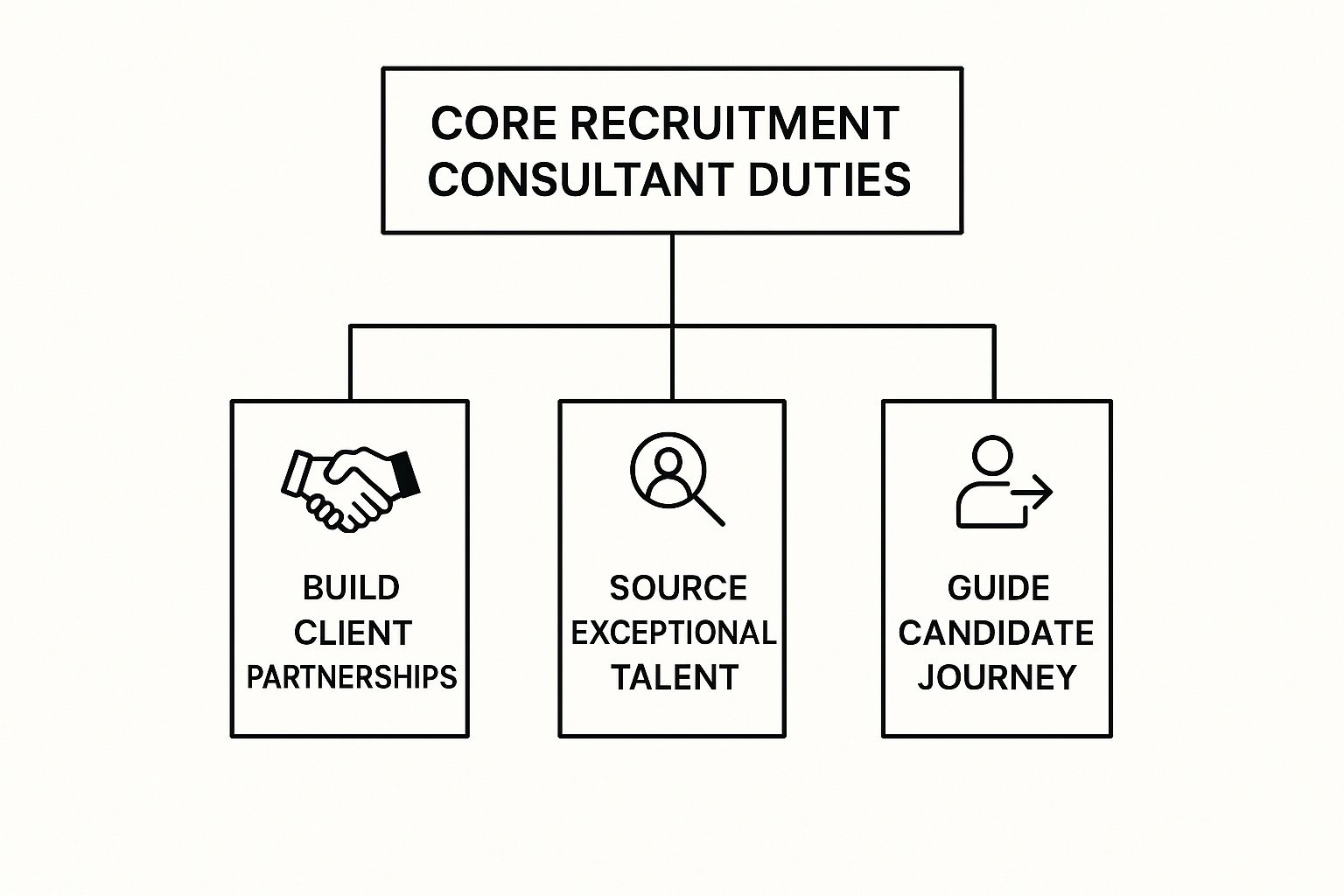Recruitment Consultant Duties and Responsibilities Explained
- Ricky Cohen
- Oct 9, 2025
- 15 min read
At its heart, the job of a recruitment consultant is to be the vital connection between companies that need to hire and talented professionals looking for their next career move. But it's so much more than just playing matchmaker. A great consultant steers the entire hiring journey, from winning a new client to placing the perfect candidate, making sure everything clicks for both sides.
What a Recruitment Consultant Really Does
Think of a recruitment consultant as an architect for a company's team. They don't just fill empty seats; they build the bridge between a business's ambitions and the people needed to make them a reality. This role is a unique mix of sales, marketing, and human resources, demanding sharp commercial instincts and even sharper people skills. Ultimately, it's all about solving problems. A client has a gap in their team, and the consultant is there to find the best possible person to fill it.
This means going far beyond just flicking through a pile of CVs. Consultants dig deep to understand a client's company culture, the dynamics of the existing team, and their goals for the future. On the other side of the coin, they become career coaches for their candidates, guiding them through the often-tricky job market and helping them shine in interviews. This dual focus is what separates the good from the great.
To get a better sense of how it all fits together, this infographic breaks down the main parts of the role.

As you can see, the work really boils down to three core areas: building strong client relationships, finding skilled professionals, and expertly managing the candidate's journey from application to offer.
To give you a snapshot of how these responsibilities break down, here’s a quick summary table.
Key Pillars of a Recruitment Consultant's Role
Responsibility Pillar | Key Activities |
|---|---|
Client Relationship Building | Business development, networking, negotiating contracts, understanding client needs, and providing market insights. |
Talent Sourcing & Attraction | Writing job adverts, searching CV databases, headhunting passive candidates, and building talent pools. |
Candidate Management | Screening applications, conducting interviews, preparing candidates for clients, and managing the offer process. |
Process Coordination | Scheduling interviews, gathering feedback, mediating negotiations, and ensuring a smooth onboarding experience. |
These pillars are the foundation of everything a consultant does, working together to achieve a successful placement.
The Three Pillars of Recruitment Consultancy
These three core areas cover the entire lifecycle of a successful hire. Each one is completely dependent on the others. You can't have one without the other two.
Building Client Partnerships: This is where the commercial drive comes in. It's about proactive business development, negotiating contracts, and earning the right to be a trusted advisor on a company’s hiring plans.
Sourcing Exceptional Talent: This is the detective work. Consultants use a whole host of tools and their own networks to uncover not just people actively looking for a job, but also those hidden gems—skilled professionals who might not be searching but are the perfect fit.
Guiding the Candidate Journey: This is the human side of the job. It involves everything from that first screening call to prepping a candidate for their big interview, managing the job offer, and giving constructive feedback.
In a specialised field like construction, mastering these duties is non-negotiable. A first-class **construction recruitment agency** has to be brilliant in all three areas to consistently find reliable, skilled workers for complex and demanding projects. Now, let’s dive into each of these responsibilities in a bit more detail.
Building Winning Client Partnerships

While everyone talks about finding great candidates, let's be honest: the real engine of any recruitment business is strong client relationships. One of the most important recruitment consultant duties and responsibilities is getting out there and developing new business. You can't just sit back and wait for the phone to ring with a new job vacancy; you have to actively hunt for opportunities.
Think of yourself as a talent scout, but for businesses. Your work starts long before a job ever gets advertised. It's about spotting companies with growth potential, getting to grips with the projects they're running, and starting conversations that prove you can add real value. This is the sales side of the job, and it demands resilience, a solid understanding of the market, and a knack for building a connection quickly.
The aim here isn't just to make a one-off placement. It’s to evolve from being just another supplier to becoming a go-to, trusted talent advisor.
From Cold Call to Trusted Advisor
That journey from a name on a list to a valued partner is built on a few key skills. A great consultant masters the art of consultative selling. This means you’re not just trying to flog a service; you're focused on truly understanding a client's headaches and challenges. It’s a strategic approach that builds your credibility and gets you in the door.
So, what does this actually look like day-to-day?
Market Research: This is your homework. It means identifying potential clients in your niche—for example, spotting a main contractor that's just won planning for a new development and will soon need boots on the ground.
Prospecting: This is about making that first move. You'll be picking up the phone, sending targeted emails, and networking to introduce yourself and what you do.
Needs Analysis: Once you have a meeting, it's about digging deep. You need to understand more than just the technical skills for a role. What's the company culture like? How does the team operate? What are their bigger, long-term goals?
The real skill here is listening far more than you talk. A top consultant can uncover problems a client hasn’t even fully recognised yet, like an impending skills shortage on a project, and offer a solution before it turns into a fire fight.
This is the kind of deep understanding that lets you provide genuine, proactive advice, pushing the relationship far beyond a simple transaction.
Negotiating and Managing a Partnership
Once you’ve started to build that relationship, a new set of responsibilities kicks in. Negotiating terms of business is a fundamental part of the job. It requires a sharp commercial mind to agree on fees and service levels that work for both your agency and the client. This isn’t just about haggling over price; it’s about setting clear, upfront expectations.
Managing the partnership effectively means keeping the lines of communication wide open. You need to provide regular updates on your candidate search, give honest feedback on the market (even when it’s not what they want to hear), and manage their expectations realistically.
For instance, if a client is trying to hire a site manager with a very specific, hard-to-find skill set for a salary that's well below market rate, your job is to present them with the data and guide them towards a more competitive offer.
Ultimately, this cycle—winning the business, understanding the need, and professionally managing the relationship—is what allows you to build a sustainable book of clients. It shifts your role from simply filling jobs to building the very foundations of your recruitment success.
The Hunt for Exceptional Talent

Finding the right people for a construction project isn’t just about posting a job ad and waiting. It’s a proper hunt. It demands a sharp eye for detail, a deep understanding of the market, and a bit of creative thinking to reach the best candidates.
This is the bread and butter of a construction recruitment consultant. We’re not just filling roles; we’re sourcing the skilled hands and sharp minds that get projects built on time and to standard. It starts with making your job advert stand out, using keywords that speak directly to tradespeople – things like site safety, shift patterns, and pay rates. Get that right, and you'll immediately grab their attention.
A few core tactics are non-negotiable for success:
Write job descriptions that actually connect with skilled tradespeople.
Get comfortable using tools like LinkedIn Recruiter and other niche job boards to find people who aren't actively looking.
Keep an eye on industry forums and professional groups; it's a great way to spot talent early.
Tag and label every candidate properly in your system by their trade and availability. It makes shortlisting so much faster later on.
Crafting Magnetic Job Descriptions
Think of a job description as a magnet. A good one pulls in exactly the right people, while a bad one attracts everyone and anyone, wasting your time.
Your description needs to paint a clear picture of the job, from the key responsibilities to the site environment and the must-have tickets or qualifications.
Use language that people on-site actually use. Talk their talk.
Clearly outline the safety protocols and mention any training you offer. It shows you care.
Show them there's a path forward. What does career progression look like?
Headhunting Passive Candidates
This is where the real magic happens. The best site manager or specialist groundworker probably isn't scrolling through job boards – they're already busy on another project. Headhunting these passive candidates is a game-changer.
“Passive candidates often bring that rare specialism that can make or break a project. They’re the ones who elevate the entire team’s capability.”
This means you need to do your homework. Map out competitor companies, look through industry networks, and find these hidden gems. A generic message won’t cut it; you need to craft a personalised note that references their past projects or skills to show you’ve actually paid attention. It's how you start building a pipeline of talent for the long run.
Building a Talent Pipeline
A strong talent pipeline is your secret weapon. It means when a client suddenly needs a team of bricklayers for a new phase, you’re not starting from scratch. You’ve already got a list of available, vetted people ready to go.
Keeping this pipeline warm is crucial. Regular check-ins, updates on upcoming projects, and quick skill assessments keep good candidates engaged with you, not your competitors.
Schedule a quick call or message every quarter to check their availability.
Use a good CRM to keep track of every conversation and bit of feedback.
Consider hosting informal virtual meetups to keep your network strong.
A great consultant is always thinking ahead, aligning their talent pipeline with future project demands and emerging skills gaps in the market.
Leveraging Advanced Sourcing Tools
Gone are the days of just relying on a CV database. Modern sourcing tools give you incredible reach and precision. For instance, mastering Boolean search on LinkedIn Recruiter lets you slice through thousands of profiles in seconds to find exactly who you need.
By combining job-specific keywords (like 'shuttering carpenter' or 'M&E supervisor') with advanced filters like location and previous employers, you can pinpoint the perfect candidates with impressive accuracy.
Use a tight location radius combined with current company filters to target local experts.
Save your best search templates to avoid reinventing the wheel for common roles.
Pay attention to the analytics. If one set of keywords gets a better response rate, use it more.
The Power of Networking
Digital tools are fantastic, but they’ll never replace good old-fashioned networking. Building real relationships in the construction world is a marathon, not a sprint.
Getting out to site visits and trade events introduces you to people you’d never find online. It's where you hear about the best workers from the people who actually work with them.
“Being a consistent, trusted presence at industry gatherings doesn’t just build your contact list – it builds trust. That’s what opens the door to top-tier passive talent.”
Forging links with local training centres is another brilliant move, giving you first dibs on newly qualified apprentices eager to start their careers. This grassroots approach perfectly complements your digital sourcing and enriches your talent pool.
This proactive hunt for talent requires discipline and a creative spark. You might find our guide on staffing general labour roles useful: General Labour Workforce Solutions.
Ultimately, mastering these duties is what separates a good consultant from a great one. In the fast-paced construction market, it’s this relentless, proactive approach that leads to faster placements, stronger project teams, and happier clients.
Guiding Candidates on Their Career Journey

Far too many people think a recruiter just fires CVs at job openings. The reality is, one of the most important recruitment consultant duties and responsibilities is to be a career guide, an advocate, and a trusted advisor for candidates. It’s less about sales and all about building genuine relationships.
Think about it: changing jobs is a massive life event. A great consultant gets this. They become a navigator for the candidate, steering them through what can be a confusing and stressful hiring process, making sure they feel supported at every turn.
This whole process kicks off from the very first phone call, where the real goal is to understand not just a candidate's skills, but their long-term ambitions. What do they really want from their next role?
Conducting Insightful Interviews and Screenings
The first screening call isn’t just a box-ticking exercise. It's a chance to get the real story behind the CV. Your job as a consultant is to dig deeper than the bullet points. What projects are they genuinely proud of? What tough situations did they have to figure out?
Effective screening means getting into the details:
Technical Vetting: You have to ask the right questions to make sure their skills are up to scratch. In construction, this is non-negotiable – do they have the right tickets and certifications for the job?
Cultural Fit Assessment: You need to get a feel for their personality and preferred work environment. There’s no point placing a lone wolf in a team that thrives on collaboration.
Motivation Check: Find out why they're looking to move. This helps ensure their reasons for leaving their current role align perfectly with what the new opportunity offers.
When you have this level of detail, you can represent them to your client with real passion and conviction, not just as a piece of paper but as a solution to their problem.
Preparing Candidates to Succeed
Once a candidate gets shortlisted, your role switches from investigator to coach. Now, it's your duty to make sure they walk into that interview room feeling prepared, confident, and ready to shine. This step alone can dramatically increase their chances of landing the job.
A well-prepared candidate is a direct reflection of a diligent consultant. It tells the client you haven’t just found talent, but you’ve taken the time to ensure they're a serious contender who understands the company and the role.
This coaching involves giving them the inside track on the company's culture, the personalities of the interviewers, and the specific challenges they’ll be asked about. You’ll often run through tricky interview questions and help them shape their answers to show off their most relevant experience.
Managing Offers and Negotiations Skillfully
Navigating the final stages is a delicate dance. When an offer comes in, you become the intermediary, handling the negotiations around salary, start dates, and other contract details. Having a strong, trust-based relationship with both the candidate and the client is absolutely critical here.
A key part of this is managing expectations on both sides to get everyone to a "yes" without any drama. For contractors, this might also involve clarifying payment schedules and processes, which can get complicated. This is where an understanding of options like **managed payroll services** can be a huge help, adding value for everyone involved.
But the job isn’t done when the offer is accepted. A great consultant follows up, making sure the candidate’s first few weeks go smoothly. And what about the candidates who didn't get the job? Providing them with constructive, respectful feedback is a must. It keeps the relationship positive, grows your network, and cements your reputation as a true professional in the industry.
Navigating the Shifting UK Recruitment Market
Think of a great recruitment consultant less as a matchmaker and more as a seasoned guide. Their job isn't just about pairing a CV with a job description; it's about being a genuine market expert, with their finger firmly on the pulse of economic trends, industry shifts, and what's happening on the ground. They don’t just fill roles; they help their clients understand the world they're hiring in.
This advisory role has never been more crucial. With things like inflation, persistent skills shortages, and the new normal of flexible working, the old hiring rulebook has been thrown out. A consultant's real value shines when they can translate all this complex market noise into clear, practical advice that gives their clients a real advantage.
Understanding Economic Headwinds
The UK recruitment market is a fantastic case study in this complexity. While the industry is on track to hit £24 billion in yearly revenue—a sign of robust health—it's happening against a strange backdrop. Permanent job openings have actually dipped, and businesses are hesitating to hire thanks to stubborn inflation. You can dig deeper into these numbers in the full industry report from IBISWorld on the UK's employment placement sector.
What does this mean for a consultant on the front line? It means being proactive is non-negotiable. It’s about advising a client on what a competitive salary really looks like right now, explaining the rising appeal of contract work, and figuring out how to attract top talent when budgets are being squeezed. It's about bringing solutions to the table, not just a pile of CVs.
The Skills Shortage Imperative
If there's one thing defining the market right now, it's the skills gap. The UK is facing a shortfall of over 2.5 million highly skilled workers, which has completely changed the game. Hiring is now all about skills, forcing consultants to look far beyond a candidate's formal qualifications.
This is where a consultant proves their worth. It’s when they can spot transferable skills, suggest upskilling opportunities, or help a client see the raw potential in someone who doesn’t tick every single box on paper but has the core ability to thrive.
This is the kind of insight that turns a consultant into a vital partner. To do this, they need to be able to:
Analyse supply and demand: They know exactly which skills are gold dust in a particular area and which are more common.
Advise on talent attraction: They help clients build offers that resonate with in-demand professionals, focusing on what matters beyond the payslip.
Identify emerging roles: They spot new job types or skill needs before they hit the mainstream, giving their clients a head start.
By truly mastering this market intelligence, a consultant elevates themselves from a simple service provider to a strategic asset. They become the eyes and ears for their clients, helping them cut through the uncertainty and build strong, talented teams ready for whatever comes next.
Staying Ahead with New Tools and Strategies
The job of a modern recruitment consultant is about more than just filling today's open roles; it’s about looking around the corner and anticipating what a client will need tomorrow. This means getting comfortable with technology and becoming a genuine talent partner who offers forward-thinking advice.
Let’s be honest, just having great people skills isn't enough anymore. A huge part of the job now is getting to grips with new tools, especially those driven by Artificial Intelligence (AI). Think AI sourcing platforms that can dig up talent nobody else can find, or automated screening software that handles the initial heavy lifting. This tech-first mindset is what separates a good consultant from a great one, helping them work faster and smarter.
Evolving into a Strategic Advisor
This shift from simple matchmaker to strategic advisor isn't just happening in recruitment. The UK is home to around 245,200 management consultants, and their roles are changing just as quickly. A telling statistic shows that 66% of consultants think AI will be the single biggest area for growth in the next year. You can dig deeper into these numbers with Statista's latest industry data.
The consultant of the future is an indispensable talent partner, not just another supplier. They add real value by helping clients sharpen their employer brand and cook up creative strategies to tackle those stubborn skills gaps.
Ultimately, this proactive approach—advising on everything from a client's market reputation to their internal training plans—is what modern recruitment consultant duties and responsibilities are all about. It’s about building strong, future-proof workforces that can handle whatever comes next.
Got Questions? We’ve Got Answers
Stepping into the world of recruitment, whether you're hiring a consultant or thinking of becoming one, can feel a bit like learning a new language. Let's clear up some of the most common questions about what this job really involves day-to-day.
Agency vs. Internal Recruiters: What's the Real Difference?
It all boils down to who signs your paycheck.
An agency recruitment consultant is essentially an external expert hired by multiple companies. They work for a recruitment firm, and a huge part of their role is actually business development—they're out there winning new clients and managing a whole portfolio of different businesses.
On the other hand, an internal recruiter (often called an in-house recruiter) is on the company's own payroll. Their entire world revolves around finding talent for that one organisation. They work hand-in-glove with the hiring managers down the hall and live and breathe the company's brand. There’s no external "sales" involved; it’s all about building the team from within.
How Does the Pay Structure Work?
This is another key difference between the two paths. Agency consultants usually have a basic salary topped up with commission. That commission is a slice of the fee the client pays when a candidate is successfully placed, so your earnings are directly tied to your results. It's a structure that really rewards the sales and negotiation side of the job.
Internal recruiters are typically on a standard salary. They might get a performance-related bonus, but it isn't linked to individual placements in the same direct, high-stakes way.
What Skills Truly Matter in This Job?
To really succeed as a recruitment consultant, you need a specific blend of skills that goes way beyond just scanning CVs.
Resilience: Let's be honest, you'll face rejection. A lot. Clients will say no, and so will candidates. The ability to shake it off and keep going is absolutely fundamental.
Communication: This is more than just being a good talker. It’s about building genuine rapport, truly listening to what people need, and explaining things with clarity and confidence.
Sales Instincts: At its core, this is a sales job. You're persuading a company to trust you with their hiring and convincing a great candidate that your opportunity is the right one for them.
Top-Notch Organisation: Picture this: you're juggling a dozen different roles for five different clients, with a pipeline of 50 candidates. Without brilliant organisational skills, things would fall apart, fast.
Getting these skills right is what separates the average from the excellent and is the key to mastering all the recruitment consultant duties and responsibilities.
At Phoenix Gray Rec Ltd, our team lives and breathes these responsibilities every single day, connecting the best talent in construction with career-defining projects across the UK. If you're looking for a partner who gets it, find out how we can help your team.
Article created using [Outrank](https://outrank.so)





Comments